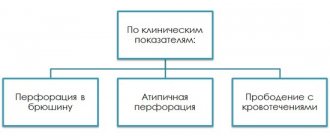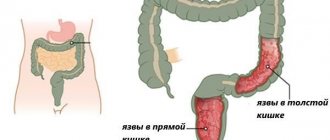Etiopathogenesis of peptic ulcer
Pain and digestive disorders accompany stomach and duodenal ulcers. In addition to infection and dysfunction of secretion, peptic ulcer disease is caused by depression, chronic stress and anxiety. A stress ulcer is formed as a result of increased tone of the vagus nerve, due to increased secretion of gastric juice. During nervous overstrain, a large amount of stress hormone is produced, the excess of which provokes a disruption in the secretion of protective mucus. Against the background of depression, the activity of digestive enzymes decreases and acidity increases. The mucous membrane of the stomach and duodenum becomes unprotected without sufficient mucus and is subject to the destructive action of enzymes.
Psychosomatics as a cause of diseases
The term comes from the Greek terms soul and body. Psychosomatics is a branch of science about the influence of psychological causes on the occurrence of diseases.
Within the framework of this direction, the influence of the emotional state on the human body is studied:
- personal characteristics;
- character traits;
- style and behavior patterns;
- internal emotional conflicts.
Ignored psychological problems manifest themselves in the form of symptoms of disorders of various body systems. Sigmund Freud formed his theory of the unconscious mind and repression into the subconscious based on his study of psychosomatic diseases.
The theory of psychosomatics is based on emotions:
- sadness;
- anger;
- interest;
- fear;
- joy.
Psychosomatics is classified as an interdisciplinary scientific field:
- medicine, so aimed at treating diseases;
- physiology, studies the influence of emotions on physiological processes;
- psychology, explores psychological mechanisms associated with diseases;
- psychotherapy, studying ways to change destructive behaviors and reactions;
- social science, explores the connection of psychosomatic disorders with cultural and traditions.
What lies behind gastrointestinal diseases?
Let's think about this fact. Often, gastrointestinal diseases are associated with food. And if translated into psychological language, the psychosomatics of gastrointestinal diseases can be described as SELF-CUTTING or DIGGING YOURSELF.
Louise Hay compiled tables of diseases on the psychosomatics of the gastrointestinal tract and how to treat them.
And understanding the relationship between physical symptoms and psychological ones helps to benefit from productive treatment.
Below in the article you can find out what causes pain and ailments.
One of the most common diseases is irritable bowel syndrome: abdominal pain, discomfort, bloating, diarrhea. And if you look for some external reasons, such as eating something stale or catching a virus, then you will not find any reasons. Look for a chronic situation in your life in which you feel irritated and do not express it to the fullest extent.
Stomach upset, diarrhea—you’re upset about something and you’re not letting it show to yourself.” What will others say, what if they judge?” You need to keep your problems to yourself. There may also be an inability to digest situations and a desire to get rid of it as quickly as possible.
Gastritis, or stomach ulcer, is a chronic, deeply suppressed aggression that turns into aggression directed at oneself. Devouring oneself. Vomiting - disgust, rejection of something and the desire to throw it out.
Constipation is holding emotions inside. You should think about why it is so difficult for you to let go of what you have already accepted.
Today, much attention is paid to the psychological life of a person. What he thinks about most, how he thinks, how he reacts to events in his life - directly affects the human body. So what does the work of the stomach depend on, and how should you think in order to get rid of an ulcer or gastritis according to psychosomatics?
Even in ancient times, people understood that the soul is directly connected to the body. And if there is no balance in the soul, no harmony, then there will be no such thing in the body. The person will be tormented by pain, obsessive thoughts, despondency and bad mood. Previously, it was believed that in this way the soul makes it clear to a person that he is living incorrectly, that he needs to pay attention to something. And then it was often possible to “heal” the patient simply by listening to him or through conversation.
Over time, science has developed. Outstanding psychologists and doctors began to appear who devoted their lives to studying the problems of humanity. Recently, psychosomatics has reached a scientific level. Hypotheses about the influence of a person’s psychological state on the body have been confirmed in research and experiments. Experts successfully searched for and found new ways to relieve patients from their ailments. In this form, psychosomatics has reached our time.
Modern doctors no longer deny that many diseases can be caused primarily by psychological problems. These include: diseases of the gastrointestinal tract, reproductive system, eye diseases, throat diseases - in general, any ailment, one way or another, can be caused not by external factors (living conditions, climate, predisposition, etc.), but by internal, psychological .
For the first time, the psychosomatics of diseases was brought to a popular level by Louise Hay. Through her example, she proved that positive thoughts and self-hypnosis truly work wonders. With the help of affirmations (positive statements) and daily work on herself, Louise got rid of uterine cancer! Her story inspires millions of people around the world - you can cure any disease, the main thing is to make every effort to do so.
The term comes from the Greek terms soul and body. Psychosomatics is a branch of science about the influence of psychological causes on the occurrence of diseases.
Within the framework of this direction, the influence of the emotional state on the human body is studied:
- personal characteristics;
- character traits;
- style and behavior patterns;
- internal emotional conflicts.
Ignored psychological problems manifest themselves in the form of symptoms of disorders of various body systems. Sigmund Freud formed his theory of the unconscious mind and repression into the subconscious based on his study of psychosomatic diseases.
The theory of psychosomatics is based on emotions:
- sadness;
- anger;
- interest;
- fear;
- joy.
Psychosomatics is classified as an interdisciplinary scientific field:
- medicine, so aimed at treating diseases;
- physiology, studies the influence of emotions on physiological processes;
- psychology, explores psychological mechanisms associated with diseases;
- psychotherapy, studying ways to change destructive behaviors and reactions;
- social science, explores the connection of psychosomatic disorders with cultural and traditions.
Psychosomatic causes of gastric and duodenal ulcers
Psychosomatic medicine explains many diseases. Psychoanalysts, doctors and scientists at different times studied human psychological problems and their impact on health.
Stomach ulcers and other diseases of the gastrointestinal tract (gastrointestinal tract) are classic manifestations of psychosomatics. This category of disorders is multifactorial, the occurrence, course and outcome of which depend on the interaction of environmental factors with the psychological and personal qualities of a person.
Research into the causes of peptic ulcer disease has shown that it occurs in patients with the following emotional problems:
- internal conflict;
- fear of loneliness;
- desire for leadership;
- recent psychological trauma;
- despair;
- suppression of negative emotions;
- anxiety;
- uncertainty;
- suspicion;
- feeling of inferiority.
Research on psychosomatics has confirmed that unstable mood and polar, brightly colored emotions lead to disorders, “sores” of the digestive organs and ulcers. When personal needs are unmet, the protective functions of the systems are reduced, and the digestive organs are the first to suffer.
Emotions and stomach diseases
Or you do not have a sufficient sense of self-preservation. Infancy causes you to give up trying to protect yourself.
However, there is another way of developing gastritis - aggressive. When you are consumed by unexpressed anger, the hydrochloric acid of the stomach, which is very aggressive by nature, becomes even more concentrated. The mucous membrane does not cope with its protective function. This suggests that you are unable to forgive and forget the offense. If you tend to bury grievances within yourself, it immediately becomes clear why your stomach hurts: psychosomatics played an important role here.
Some direct aggression inward, while outwardly remaining calm and even peaceful. But lava spills inside, which harms, first of all, themselves. This could be a reaction to events or simply anger at yourself due to failure or low self-esteem. Others freely express their aggression. But this does not help either, because conflict situations are constantly repeated. Ultimately, it culminates in gastric ulcers. This is obvious psychosomatics: the stomach is eating away at itself.
If any of the above emotions are suffocating you, it is not surprising that one of the above diagnoses soon arises. Moreover, it is these emotions that can lead to stomach tumors.
Alexander Franz about the occurrence of ulcers
A psychoanalyst from Hungary, the creator of psycho-oriented criminology and psychosomatic medicine, argued for the need for a mental approach to the interpretation and treatment of diseases. A look at diseases, their origin and course from the point of view of psychosomatics is a new approach to understanding the body as a whole mechanism where all systems are interconnected. Bodily processes are influenced by psychological ones, since all parts of the body are interconnected. Alexander believes that addiction and support seeking have an impact on digestive and nutritional functions.
Franz's book describes the psychological problems of a person suffering from a nervous ulcer:
- withdrawal “inward” (vegetative state) instead of directed action outward;
- anxiety;
- search for security, help;
- suppressed desire for love;
- the dependent desire to be protected is associated with the desire to be fed, as a result of which the production of gastric secretions increases.
Type of personality of an ulcer patient:
- hard;
- vigorous;
- enterprising;
- feminine character traits in a man.
The dependence and demand for a sense of security, strongly recorded in early infancy, comes into conflict with the ego in adulthood and infringes on self-esteem. This attitude is in conflict with the desire to assert oneself and achieve independence. Until these contradictions are eliminated, the ulcer progresses.
Positive dynamics in treatment is achieved:
- change of environment;
- rest;
- switching to positive emotions;
- systematic psychotherapy aimed at solving basic personality problems.
Louise Hay's approach
The author of best-selling books on psychology and self-help argues that physiological disorders are a reflection of internal deep processes. To get rid of a disease, you need to find its mental cause and eliminate it. The list of spiritual causes of illness was compiled by Louise Hay based on her own experience working with patients.
The author recommends finding the psychological causes of your illness in the table and replacing them with new positive thoughts and affirmations (positive attitudes).
Causes of intestinal problems, stomach and duodenal ulcers according to Louise Hay and new stereotypes of thinking:
- peptic ulcer - fear, low self-esteem, desire to please others - I am a wonderful person, I love myself and approve of every step I take, I am completely calm;
- stomach ulcer - fear, confidence that you are not good enough, anxiety, anxiety that you may not like it - I love and value myself, I am in harmony with myself, I am beautiful;
- peptic ulcer - you constantly restrain yourself, do not allow yourself to speak out, blame yourself for everything - I see only joyful events in my loving world;
- heartburn - fear and once again fear, chilling the soul - I breathe freely and deeply, I am safe, I have confidence in life;
- stomach - retains food, digests ideas - I easily “digest” life;
- stomach diseases - horror, fear of new things, inability to learn new things - I have no conflicts with life, I constantly learn new things every minute, everything is fine.
Louise Hay recommends healing with love. such a feeling overcomes anger, fear, contempt, creates security and harmony.
The author's recommendations for using the disease table:
- Find the psychological reason using the table. If it doesn’t fit, ask yourself the question: “What thoughts provoked my illness?”
- Say out loud several times: “I want to free myself from the stereotypes in my mind that caused my illness.”
- Say the new setting several times.
- Deeply implant in your consciousness the thought that you have already embarked on the path of complete healing.
- Repeat the four steps again.
Louise recommends repeating these classes daily.
L. Hay describes the path to healing as the art of forgiveness, self-love. She calls the data “My Ten Steps.” This technique describes 10 ways to learn to love yourself.
L. Hay talks in his books about healing as a set of measures to work on oneself, one’s thinking. A good emotional state and positive emotions are the basis of good health, says Louise Hay.
Valery Sinelnikov's opinion on stomach and duodenal ulcers
The views of the Ukrainian homeopath and psychotherapist were formed on the basis of the works of Louise Hay, after studying NLP, Zen Buddhism, yoga and Taoism. Valery Vladimirovich Sinelnikov considers the main remedy for diseases to be bringing a person’s thoughts and worldview to the “laws of the Universe,” the main of which are pure thoughts.
Psychosomatics of stomach ulcers according to Sinelnikov in the book “Love your illness”:
- lack of understanding of how to assimilate life;
- constant worries and fears;
- irritation;
- hostility;
- feeling of uncertainty;
- doom;
- fear of everything new;
- feeling of inferiority, inferiority;
- "self-criticism";
- fear of not being able to do something;
- disgust;
- rejection of people and the surrounding world.
To heal the disease at the mental level, Valery Vladimirovich recommends reconsidering your thoughts and worldview, creating new models of behavior and perception of others. The best emotional qualities for stabilizing health in this case are love and calm.
Recommendations from the author of the book for curing stomach and duodenal ulcers:
- learn to enjoy life;
- accept yourself and the world around you as it is;
- develop a sense of love for yourself and people;
- learn to master and assimilate new things.
Liz Burbo's opinion on the psychosomatic cause of ulcers
Philosopher and psychologist who created her own healing system. L. Burbo believes that the cause of all diseases is deep blockages and unconscious lessons. To solve any problem and get rid of the disease, you need to rethink your attitude towards yourself and the world around you. According to the author, the body explains to a person through illnesses that he has fear and lack of love. With an incorrect perception of the world, lack of understanding of the meaning of life, the body gives signals in the form of disorders and diseases.
The author considers the emotional blockage that leads to stomach ulcers to be a person’s inability to accept the situation or the world as a whole. A highly developed inner critic does not allow one to listen to the voice of the heart - this is the reason why problems arise with the digestive organs. Liz believes that the beginning of health problems originates from past lives; if the lesson is not learned, the soul will have to go through it again through illness.
Psychosomatics of gastric and duodenal ulcers according to L. Burbo from the point of view of mental blockages:
- the habit of total control over all aspects of your life;
- feeling of helplessness;
- lack of strength to change life;
- disappointment.
New qualities and character traits to eliminate mental and physical blockages from stomach ulcers:
- learn to listen to the opinions of other people;
- find inner strength for positive changes;
- learn to trust people;
- defend your own opinion;
- accept everything with love;
- be more tolerant of the world and other people.
Prevention and treatment
Treatment for stomach ulcers is selected individually for each patient. Traditionally, patients are prescribed enzyme preparations, sedatives and medications to normalize the functioning of the stomach.
Prevention of this disease involves implementing the following recommendations:
- Complete smoking cessation.
- Refusal to drink strong alcoholic drinks or at least reduce their amount in the diet.
- A strict ban on various diets that have a questionable diet. This applies to modern irrational diets, which are based on eating monotonous food and fasting.
- Treat in a timely manner those gastrointestinal diseases that can cause stomach ulcers.
- Maintain proper diet. The menu should be well balanced and healthy.
- Protect yourself from infection by the Helicobacter bacteria. To do this, it is advisable to use separate utensils and utensils. It is also worth observing hygiene rules when preparing food.
- Eliminate factors that reduce immunity.
- Do not take medications without a doctor's prescription.
- Avoid stressful situations. If you are depressed, you should take sedatives and antidepressants.
- Maintain an optimal rest and work schedule. You need to sleep at least 8 hours a day.
Remember! When the first signs of an ulcer appear, you should immediately consult a doctor and begin treatment. It is extremely dangerous to engage in uncontrolled therapy or ignore the symptoms of the disease, because in this case the disease will begin to progress, which will only worsen the patient’s condition.
Oleg Torsunov about the causes of the disease
In his book “The Connection of Diseases with Character,” the author also writes about the relationship between a person’s speech and activity and his health.
Damage to the gastric mucosa, according to O. Torsunov, occurs in people in whom the following traits predominate in speech and behavior:
- discontent;
- anger;
- negative;
- cold;
- indifference;
- detachment;
- hot temper;
- emotionally charged speech and statements;
- tense and firm speech;
- toughness of character.
The psychologist believes that changing character traits and behavior in relation to the world and people improves the functioning of all body systems.
Behavior and speech to improve the condition of the digestive organs:
- tenderness;
- confidence;
- hard work;
- kindness.
Anatoly Nekrasov about the origin of the disease
The author of the book “1000 and One Ways to Be Yourself” considers diseases to be disharmony, limited energy and lack of freedom. Intestinal problems, peptic ulcers of the stomach and duodenum have deeper roots from a psychosomatic point of view than it seems at first glance.
Anatoly Nekrasov believes that the causes of the disease are in the internal experiences of a person and his relationship with the outside world:
- wrong path;
- the meaning of life is lost;
- rejection of close people and situations.
According to the author, health is not just the absence of disease, but also spiritual harmony, a special state in which internal qualities are revealed to the maximum, and all needs for communication, love, and creativity are realized.
Psychological characteristics and stomach diseases
In the diagnosis of stomach diseases, the psychological characteristics of patients take place. If you have any of the following traits, it may be time to try changing your personality:
- Laziness. Because of it, all organs begin to work worse - like us, they are “lazy.” Over time, if you don't do anything to turn laziness into activity, digestion worsens due to decreased gastric acid production.
- Irritability. This is how anxiety manifests itself when interacting with the outside world; the stomach also reacts psychosomatically to it, which, in turn, increases the tendency to irritability.
- Frustration, depression, apathy, indifference to everything that happens around, slows down the work of all organs that are actively involved, including the stomach. This is the psychosomatics of atrophic gastritis, which causes depletion of the body.
- Cruelty and selfishness. Surprisingly, the stomach almost always suffers from these emotions. If you demand too much from people, especially your loved ones, coldness will eventually develop in the relationship. And then psychosomatics manifests itself - the stomach instantly reacts to the lack of harmony in the relationship.
- Despair and resentment. Heavy karma ultimately results in many problems that have to be overcome with great difficulty. If a person realizes his mistakes and believes that everything will soon return to normal, over time he will work off karma. But the lack of understanding and acceptance contributes to the formation of resentment towards fate. Feelings of despair and hopelessness appear until you understand why exactly these events are happening around you.
Ways to solve the problem from a psychosomatic point of view
At the first signs and manifestations of a psychosomatic ulcer, it is necessary to undergo treatment not only from a gastroenterologist, but also from a psychotherapist, or to look into your inner world on your own. Working through your deepest fears and experiences when working with a doctor gives positive results with regular sessions.
When working through psychological problems, they independently resort to various techniques for improving mood and obtaining positive emotions:
- yoga;
- meditation;
- dancing;
- drawing;
- music;
- martial arts;
- sport;
- courses;
- trips.
Often, drug therapy alone does not bring results or provides only temporary relief. Statistically strong emotional experiences lead to dysfunction of the digestive organs, including gastric and duodenal ulcers. It is important to understand that if a peptic ulcer is complicated by perforation or bleeding, you must seek medical help as soon as possible.
Deep neurotic conflict, which often leads to stomach ulcers, requires a long course of psychotherapy. Constant and regular work on personal qualities and control of negative emotions is the basis of recovery.
The psychosomatic approach is not only the doctor’s influence on the patient with instilling confidence. The basis is knowledge in the field of emotional factors acting on the occurrence and course of the disease. In any case, when working independently or in therapy with a psychotherapist, the patient needs to fully open up, admit his own shortcomings and fears. Accepting yourself, the world around you and resolving internal conflicts will help you cope with many diseases, including peptic ulcers. Positive emotions, kindness, gentleness, love for yourself and others contribute to good health and well-being. Self-realization and self-sufficiency are the basis of a stable mental state.
But what about antibiotics, they cope well with diseases?
If your stomach hurts, psychosomatics, as a rule, plays the “first fiddle” in this unpleasant situation. It’s worth remembering how, before an important event, “it sucks in the pit of your stomach,” “your stomach cramps.” In especially sensitive people, before an important task, the stomach may seriously ache, vomiting or even “bear sickness” may begin.
As a rule, there are no serious pathologies behind such manifestations. In this way, the body demonstrates its reaction to a strong emotion that a person is trying to restrain: fear, excitement, etc.
Antibiotics are the treatment of our body using chemicals. And then, healing is not the cause, but the effect, when the physical coverings are broken.
This is also a decision that cannot be ignored. But there is no guarantee that after completing a course of drug intervention, the disease will not return again.
You remain living according to the same scenarios, blaming yourself, being afraid to speak out, standing up for yourself if you are accused.
And all these unaccepted emotions will accumulate inside, remain lumpy, create blocks and destroy the body.
Therefore, it is extremely important to CHANGE YOUR ATTITUDE TO YOURSELF. Change your attitude towards your life, towards your thoughts.
Do not treat what has already been destroyed, but do not allow this destruction to appear.
Understand how to treat psychosomatics.
At the first signs and manifestations of a psychosomatic ulcer, it is necessary to undergo treatment not only from a gastroenterologist, but also from a psychotherapist, or to look into your inner world on your own. Working through your deepest fears and experiences when working with a doctor gives positive results with regular sessions.
When working through psychological problems, they independently resort to various techniques for improving mood and obtaining positive emotions:
- yoga;
- meditation;
- dancing;
- drawing;
- music;
- martial arts;
- sport;
- courses;
- trips.
Often, drug therapy alone does not bring results or provides only temporary relief. Statistically strong emotional experiences lead to dysfunction of the digestive organs, including gastric and duodenal ulcers. It is important to understand that if a peptic ulcer is complicated by perforation or bleeding, you must seek medical help as soon as possible.
Deep neurotic conflict, which often leads to stomach ulcers, requires a long course of psychotherapy. Constant and regular work on personal qualities and control of negative emotions is the basis of recovery.
The psychosomatic approach is not only the doctor’s influence on the patient with instilling confidence. The basis is knowledge in the field of emotional factors acting on the occurrence and course of the disease. In any case, when working independently or in therapy with a psychotherapist, the patient needs to fully open up, admit his own shortcomings and fears.
Accepting yourself, the world around you and resolving internal conflicts will help you cope with many diseases, including peptic ulcers. Positive emotions, kindness, gentleness, love for yourself and others contribute to good health and well-being. Self-realization and self-sufficiency are the basis of a stable mental state.
The psychomatics of stomach diseases requires the help of a specialist. First, find the causes of stomach illness in yourself - on your own or with the help of a psychotherapist. Once the cause is discovered, it will be much easier to cure its effect. Think about the situations that led to the disease. This may be one situation, but it may be several. Remember - accept it and put it down. Let the emotions that overwhelm you against your will disappear.
Look for positive emotions. Sports, hobbies, reading, love. Surround yourself with happiness, look for it in every day. It is there, but we don’t see it, immersed in our problems, as if in a vacuum. Every person will one day realize what psychosomatics is. Everyone probably had a stomach ache after terrible stress or their throat tightened from unspoken words.
Psychiatrists often prescribe antidepressants or tranquilizers to their patients, while specialists in the field of alternative medicine prefer gentler methods - visceral massage, which relieves spasms from the abdominal organs, therapeutic manual massage, which helps relieve stress, as well as other methods. Louise Hay, for example, advises using auto-training that adjusts the emotional background to a more favorable wave.
It is always worth starting work in two directions at the same time. First, consult a doctor, undergo a full investigation, identify all the causes and factors that you can influence.
For example, alcohol and smoking are obvious factors that provoke the disease, and a duodenal ulcer is an excellent reason to give up these addictions.
In addition, the doctor will help instantly reduce the symptoms and manifestations of the disease in the body. That is, you will get relief in the near future.
You will get relief, but getting rid of a chronic disease will occur when the level of stress hormones decreases and does not provoke more and more exacerbations.
This will happen by working on your emotions. You can work with them yourself, or you can with the help of a psychologist, which will help save time.
With social realization, a person strives to reach new heights, it is important for him to prove something, not to fall in the face, it is important to become a beacon for his relatives and friends.
And everything would be fine, but at the same time it is important to maintain a positive attitude and fully accept the possibility of defeat. Which are inevitable in social implementation. And many are unable to come to terms with possible failure in advance, which is why they experience anxiety.
It is necessary to accept these moments and work through your fears, which are different in each specific case. Then the psychosomatics of the stomach and duodenal ulcer will gradually fade away until complete recovery.
Some experts see the solution in accepting the situation and any result.
For example, Sinelnikov characterizes a gastrointestinal patient as an anxious, irritable and restless person. And the famous Louise Hay writes about an ulcer that it is a clot of obsessive and disturbing thoughts about one’s own inferiority.
So it turns out that ambition and constant striving without internal psychological study are a source of stress and illness in the body!
Well, the easiest way to work through fears is with an experienced specialist.
Yes, and if you have the same problems with the gastrointestinal tract, and you want to work through them so that, on the one hand, you go towards your goals, but at the same time do not experience stress, for this we hold separate meetings at our Pro Psychosomatics school. Because sometimes the reason may lie deep in the psyche, and feedback from a specialist will help reduce the recovery time significantly. This is the fastest way - to find out exactly your reason.
General techniques also work. But this path is longer.
One of the effective methods for working with psychosomatics is the elementary technique of forgiveness.











